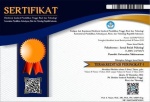Efektivitas Terapi Film Dalam Meningkatkan Percaya Diri
Abstract
Penelitian ini bertujuan untuk mengetahui efektivitas terapi film dalam meningkatkan kepercayaan diri. Metode penelitian yang digunakan adalah eksperimen dengan teknik sampel sampling purposive. Sampel penelitian ini adalah siswa SMP Negeri 31 Samarinda sejumlah 60 siswa. Penelitian ini menggunakan non-randomized pre test-post test control group design. Teknik analisa statistik yaitu uji T-test. Hasil penelitian menunjukkan bahwa terapi film efektif meningkatkan percaya diri siswa, hal tersebut berdasarkan hasil perhitungan menggunakan uji t-test dengan kaidah nilai p (< 0.050) diperoleh nilai p = 0.000 pada kelompok eksperimen, sehingga hipotesis H1 diterima yang artinya subjek yang diberikan terapi film mengalami peningkatan percaya diri.
This research aims to find the effectiveness of film therapy to increase self -confidence. This research uses experimental method with purposive sampling technique. This research takes sample from 60 students of SMP Negeri 31 Samarinda. This research uses non-randomized pre-test-post comtroul group design. This research uses T-test as the statistical analysis technique. The result shows that film therapy is effective to increase students’s self-confidence based on the result of the T-test calculating with the rule of p value (<0.050). The result shows the p value in the sample is p=0.000, therefor the H1 hypothesis is accepted. It means that the film therapy subject gets self-confidence increase.
Keywords
Full Text:
PDFReferences
Abbott, R. A., & Davies. (2004) Habitual Physical Activity and Physical Activity Intensity: Their Relation to Body Composition in 5.0–10.5-y-old Children. European Journal of Clinical Nutrition; 58.
Abedin, A., & Molaie, A. (2010). The effectiveness of Group Movie Therapy (GMT) on parental stress reduction in mothers of children with mild mental retardation in Tehran. Procedia Social and Behavioral Sciences 5. 988–993, doi:10.1016/j.sbspro.2010.07.223.
Asosiasi Penyelenggara Jasa Internet Indonesia [APJII]. (2014). Profil Pengguna Internet Indonesia. Jakarta: Asosiasi Penyelenggara Jasa Internet Indonesia.
Azwar, Saifuddin. ( 2009). Metode Penelitian. Yogyakarta: Pustaka Pelajar.
Arikunto. (2010). Prosedur Penelitian: Suatu Pendekatan Praktek. Jakarta: Rineka Cipta.
Arsyad, Azhar. (2011). Media Pembelajaran. Jakarta: PT Raja Grafindo Persada.
Bandura, A. (2005). Self-Efficacy The Exercise of Control. New York: W. H. Freemanand Company.
Bastaman, Hana J. (2001). Integrasi Psikologi Dengan Islam: Yogyakarta: Pustaka Belajar.
Barker, R. L. (1987). The social work dictionary. Silver Springs: MD: NASWBerg-Cross, L., Jennings, P., & Baruch, R. 1990. Cinematherapy: Theory and Application. Psychotherapy in Private Practice. 8 (1). 135-136
Bungin, B. (2014). Metode Penelitian Kuantitatif (edisi ke-2). Jakarta: Prenadamedia Group.
Dahar, R. W. (2011). Teori Belajar dan Pembelajaran. Jakarta: Erlangga.
Demir, E.S. (2007). Cinema Therapy. Metu: State University Of Metu.
Drajat Zakiah (2007) Kesehatan Mental. Jakarta: Gunung Agung.
Elizabeth B. Hurlock, (2003). Psikologi Perkembangan Suatu Pendekatan Sepanjang Rentang Kehidupan. Jakarta: Erlangga.
Elliot G. (2006) . Film and education. Chapter II. New York: Philosopchical library.
Fatchurahman, M. (2017). Penerapan Teknik Cynema Therapy Untuk Meningkatkan Pemahaman Siswa Terhadap Bahaya Merokok. Jurnal Psikologi Pendidikan dan Konseling, 3 (1), 1-10.
Gael Lindenfield. (1997) Mendidik Anak Agar Percaya Diri. Jakarta: Arcan
Gardner, Howard. 2003. Kecerdasan Majemuk (Multiple Intelligences) Teori dalam Praktek. Terjemahan oleh Alexander Sindoro. Batam: Interaksa.
Ghufron, M.R.(2011). Teori-Teori Psikologi. Jogyakarta: Ar-Ruzz Media
Gregerson, Marry Banks. (2010). The Cynematic Mirror for Psychology and Life Coaching. New York : Springer Science+Business Media
Hakim, T. (2002). Mengatasi Rasa Tidak Percaya Diri. Jakarta: Purwaswara
Hesley , J.W. & Hesley, J. G. ( 2001). Rent Two Films and Let’s Talk in the Morning: Using Popular Movies in Psychotherapy (2nd ) NY: Wiley and Sons
Hurlock,E.B.(2012). Psikologi Perkembangan: Suatu pendekatan sepanjang rentang kehidupan (edisi kelima). Jakarta: Erlangga
Iswidharmanjaya, D. (2004). Satu Hari Menjadi Lebih Percaya Diri. Jakarta : PT Elex media komputindo
Joseph, A. E. (2015). Reel Therapy: Using Movie in Counseling and Psychotherapeutic Practice. International Journal of Scientific & Engineering Research, 6 (8), 2100-2108.
Kuriansky, J., Ortman, J., DelBuono, J., Vallarelli, A. (2010). Cinematherapy: Using Movie Metaphors to Explore Real Relationship in Counseling and Coaching. Paper presented at Springer Science + Business Media, LCC.
Latipun. (2015). Psikologi Eksperimen. Malang: UMM Press.
Lauster, Peter. (2002). Tes Kepribadian. Jakarta: Bumi Aksara.
Lefkoe, Murty. (2012). Strategi Peningkatan Motivasi Belajar. Jakarta: Rineka Cipta.
Olivia, Femi. (2010) Mendampingi Anak Belajar Bebaskan Anak Dari Stres dan Depresi Belajar. Jakarta: PT Elex Media Komputindo
Papalia, D. E., Old, S. W., & Feldman, R. D. (2008). Human Development (Psikologi Perkembangan) edisi kesembilan. Jakarta: Kencana Prenada Media Group.
Rakhmat, Jalaludin, (2009). Psikologi Komunikasi, Bandung : PT. Remaja Rosdakarya.
Santrock, J. W. (2003). Adolescence: Perkembangan Remaja. Jakarta : Erlangga.
Sharp, C., Smith, J.V., & Cole, A. (2002). Cinematherapy: metaphorically promoting therapeutic change. Counseling Psychology Quarterly. 15(3): 269-276.
Suarez. (2006). Cinema Terapi untuk Anak. Jakarta: Departemen Psikologi Antiock University
Sugiyono (2005). Metode Penelitian Bisnis. Bandung: Alfabeta
Suwanto, I., & Nisa A. T. (2017). Cinema Therapy Sebagai Intervensi Dalam Konseling Kelompok. Proceeding Jambore Konselor 3, 147-152.
Wolz, B. (2003). Cinematherapy: Using the power of imagery in films for therapeutic process. USA: The Therapist.
Maslow, A.H. (1971). The Third Forces: The Psychology of Abraham Maslow. New York: Gable Washington.
DOI: http://dx.doi.org/10.30872/psikoborneo.v9i3.6455
Refbacks
- There are currently no refbacks.
Copyright (c) 2021 Psikoborneo: Jurnal Ilmiah Psikologi

This work is licensed under a Creative Commons Attribution-ShareAlike 4.0 International License.
Indexing by :
________________________________________
PSIKOBORNEO: Jurnal Ilmiah Psikologi Published by Faculty of Social and Political Siences, University of Mulawarman, Samarinda, East Kalimantan and This work is licensed under a Creative Commons Attribution-ShareAlike 4.0 International License.
________________________________________
PSIKOBORNEO: Jurnal Ilmiah Psikologi
Department of Psychology
Faculty of Social and Political Siences, University of Mulawarman
Jl. Muara Muntai Kampus Gn. Kelua Samarinda 75411
Phone: +62 813 35350368
E-Mail: psikoborneo@gmail.com / psikoborneo@fisip.unmul.ac.id

















